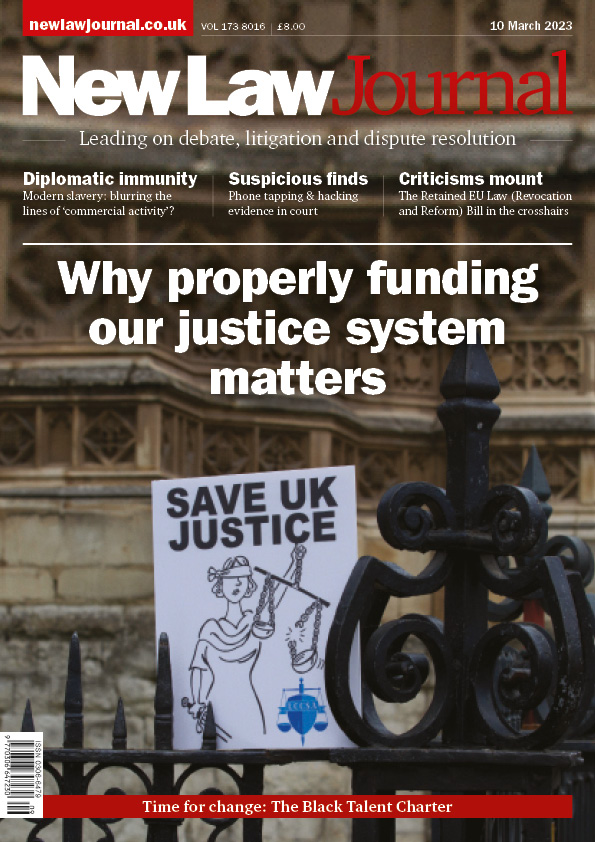THIS ISSUE

Criminal damage inflicted during public protest is an increasingly complex area, as David Walbank KC, of Red Lion Chambers, writes in this week’s Crime Brief.
The Supreme Court case of Basfar v Wong on diplomatic immunity comes under the scrutiny of Joseph Dyke and James McGlaughlin, of McNair International, in this week’s NLJ.
There seems to have been a spate of judgment embargo breaches since Sir Geoffrey Vos’s warning to forgetful, clumsy or errant lawyers last year that those who breach ought to expect contempt proceedings to follow.
‘Kompromat, often used in Russia to keep politicians and businesspeople in line, is now frequently being submitted as evidence in the courts of England and Wales,’ writes Natalie Todd, partner at Cooke Young & Keidan, in this week’s NLJ.
The proper funding of our justice system, so neglected by recent governments, is a vital issue for our society and it demands urgent action, says Geoffrey Bindman KC
In this month’s employment brief, Ian Smith breaks new ground courtesy of the Court of Appeal & navigates some tricky traps for unwary employees
Can the trafficking & slavery of a domestic worker be considered ‘commercial activity’? Joseph Dyke & James McGlaughlin examine the Supreme Court’s judgment in Basfar v Wong
Neil Parpworth considers the limits of the court’s leniency when it comes to breaching an embargo
Khawar Qureshi KC looks back on the key public international law cases before the English courts in 2022
David Walbank KC reports on the increasingly thorny issue of criminal damage inflicted through public protest
MOVERS & SHAKERS

Carey Olsen—Kim Paiva
Group partner joins Guernsey banking and finance practice
.tmb-mov69x69.jpg?sfvrsn=16d9dd3d_1)
Morgan Lewis—Kat Gibson
London labour and employment team announces partner hire

Foot Anstey McKees—Chris Milligan & Michael Kelly
Double partner appointment marks Belfast expansion
NEWS
The Ministry of Justice (MoJ) has not done enough to protect the future sustainability of the legal aid market, MPs have warned
Writing in NLJ this week, NLJ columnist Dominic Regan surveys a landscape marked by leapfrog appeals, costs skirmishes and notable retirements. With an appeal in Mazur due to be heard next month, Regan notes that uncertainties remain over who will intervene, and hopes for the involvement of the Lady Chief Justice and the Master of the Rolls in deciding the all-important outcome
After the Southport murders and the misinformation that followed, contempt of court law has come under intense scrutiny. In this week's NLJ, Lawrence McNamara and Lauren Schaefer of the Law Commission unpack proposals aimed at restoring clarity without sacrificing fair trial rights
The latest Home Office figures confirm that stop and search remains both controversial and diminished. Writing in NLJ this week, Neil Parpworth of De Montfort University analyses data showing historically low use of s 1 PACE powers, with drugs searches dominating what remains
Boris Johnson’s 2019 attempt to shut down Parliament remains a constitutional cautionary tale. The move, framed as a routine exercise of the royal prerogative, was in truth an extraordinary effort to sideline Parliament at the height of the Brexit crisis. Writing in NLJ this week, Professor Graham Zellick KC dissects how prorogation was wrongly assumed to be beyond judicial scrutiny, only for the Supreme Court to intervene unanimously







